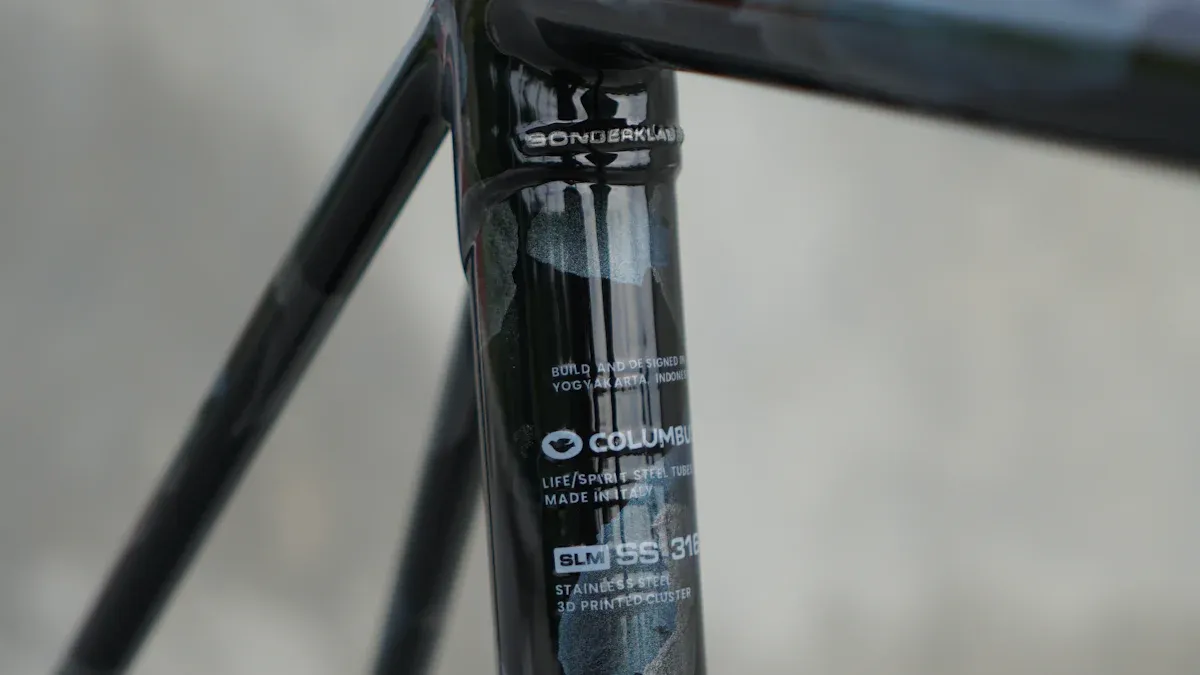
Choosing the right materials for a balance bike frame is very important. It helps keep your child safe and happy. Parents usually want frames that are strong and light. This is why aluminum and steel are popular. Some eco-friendly parents like wooden frames. They care about the environment and how the bike looks. Lately, more people are interested in composite materials. These materials are strong but also light. Other things to think about are comfort and how you can customize the bike. Picking the right balance bike makes riding fun and safe for your child.
Key Takeaways
Wooden frames look nice and last a long time. They are perfect for younger kids and families who care about the environment.
Aluminum frames are light and strong. They are also cheap, helping kids learn balance without rusting.
Steel frames are very strong and comfy. However, they are heavier and need regular care to stop rust.
Plastic frames are super light and cheap. But they might not last long or handle rough play well.
Carbon composite frames are light and strong. They cost more and need careful maintenance.
Wood Frame Materials
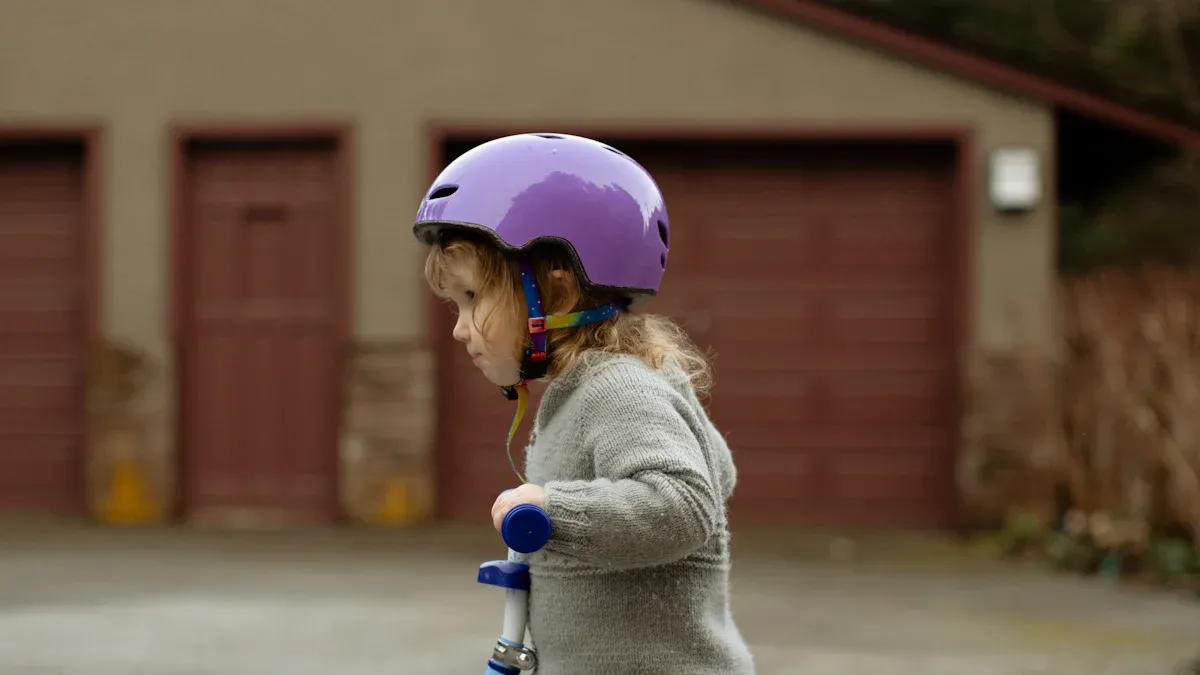
Wood Characteristics
Wooden balance bike frames look special and attract many parents. The natural style of wood is charming, making these bikes unique. Common woods used are:
Baltic birch plywood for strong and stable main parts.
Red oak for pieces like the steering tube and seat post.
Ash wood for light and tough parts.
These materials create a strong and nice-looking bike frame.
Wood Advantages
One big plus of wood frames is that they are great for younger kids. Wooden balance bikes usually weigh between steel and aluminum. This makes them easy for little riders to handle. They are also very durable and can take rough play from kids. Plus, wooden bikes often use sustainable materials, which is good for eco-friendly families.
Tip: If you want a bike that looks nice and is good for the environment, a wooden frame could be the best choice for you.
Wood Disadvantages
Even with their charm, wooden balance bike frames have some downsides. They are usually heavier than aluminum and carbon bikes, which can make them harder to steer. While they are strong, they might not last as long as metal frames. There are fewer wooden balance bikes available compared to metal ones, which are popular for being light and durable.
Aluminum Balance Bike Frame
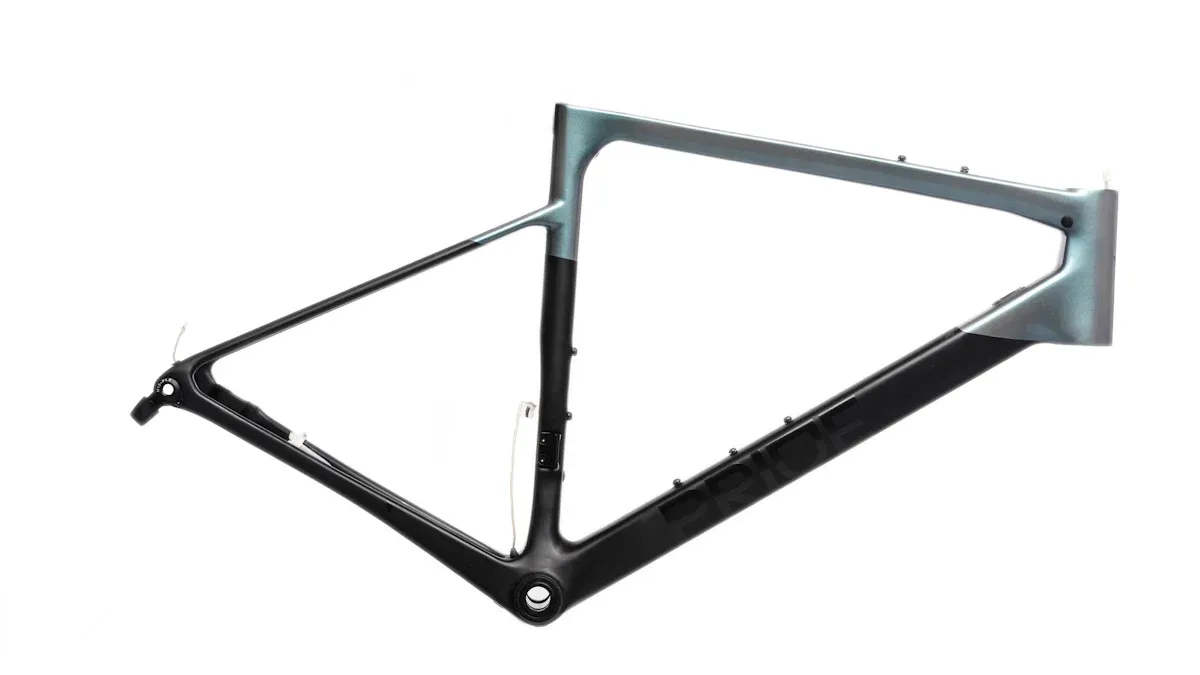
Aluminum Characteristics
Aluminum balance bike frames are liked because they are light. This makes them easy for young kids to handle. Aluminum frames usually weigh less than steel ones. This helps kids ride their bikes with confidence. The most common aluminum types used in these frames are:
6061 aluminum alloy: It is strong and resists rust well.
7005 aluminum alloy: It is stronger and lasts longer, great for performance bikes.
These types give a good mix of strength and lightness, improving the ride.
Aluminum Advantages
One big plus of aluminum frames is that they are cheap. They cost less than steel frames because they are easy to make and find. Also, aluminum frames can last over ten years if taken care of. Some users say their frames last 17 years or more with normal use.
The strength-to-weight ratio of aluminum is great. This means you get a strong but light bike. This helps kids learn balance and coordination better. Plus, aluminum frames do not rust, so your child’s bike stays in good shape even in bad weather.
Tip: When picking a balance bike, think about an aluminum frame for its strength, light weight, and low cost.
Aluminum Disadvantages
Even with many good points, aluminum frames have some downsides. They are often stiffer than steel frames. This can make the ride less comfy. This stiffness might affect how the bike feels, especially on bumpy paths. Also, aluminum frames can crack near welds if not cared for properly.
While aluminum has many benefits, it is important to check the frame often for any damage. This will help keep your child’s balance bike safe and working well.
Steel Frame Materials
Steel Characteristics
Steel frames are known for being strong and lasting a long time. They can handle rough use and tough weather. This is why many people choose them for balance bikes. Two common types of steel used in bike frames are high-tensile steel and chromoly steel.
Description & Features | Distinguishing Features | |
|---|---|---|
High-Tensile Steel | This is a common steel type used in bike frames. It is a standard choice. | It is usually heavier and not as strong as chromoly; it is traditional and very durable. |
Chromoly Steel | This is a special steel with added chromium and molybdenum. It is stronger than regular carbon steel. | It allows for thinner tubes because it is strong, making lighter frames if designed well; it gives a fun ride feel. |
Steel Advantages
One big advantage of steel frames is their durability. They can handle many loads without breaking. Tests show that steel frames often do better than expected for lasting use. This means you can count on a steel bike frame to last for many years.
Steel frames are also easy to repair. If your child’s bike gets damaged, you can usually fix it instead of buying a new one. This helps the bike last longer. Plus, steel gives a comfy ride because it can flex naturally, which helps absorb bumps and shakes.
Tip: If you want a bike that can take rough play and last a long time, think about getting a steel frame.
Steel Disadvantages
Even with many good points, steel frames have some downsides. They are usually heavier than aluminum and carbon frames. This extra weight can make them harder for very young riders to handle.
Also, while steel is strong, it can rust if not taken care of. You should check for any signs of wear or damage regularly. Lastly, while steel frames are often cheaper than titanium or carbon ones, they can still cost more than aluminum frames.
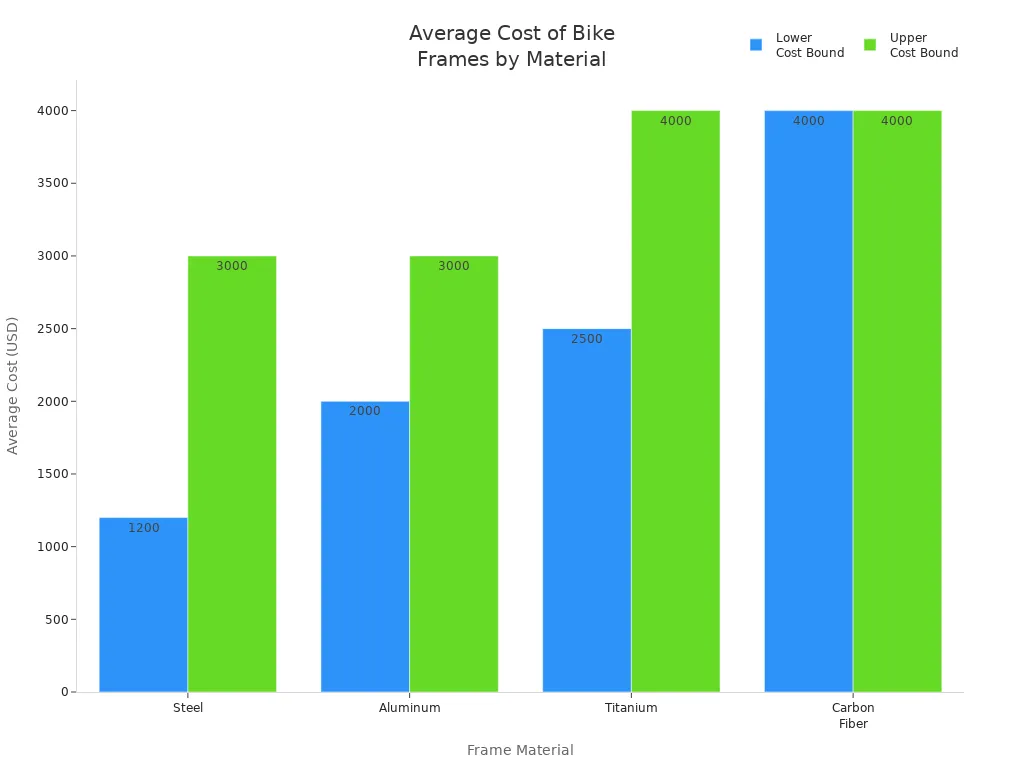
Plastic Balance Bike Frames
Plastic Characteristics
Plastic balance bike frames are getting popular because they are very light. These frames usually weigh less than wood and metal bikes. Common plastics used are high-density polyethylene (HDPE) and polypropylene. These materials are strong and flexible, making them great for young riders.
Plastic Advantages
One big benefit of plastic frames is their affordability. You can find bikes like the Lava Sport Balance Bike for about $36. This makes them easy for many families to buy. Other bikes, like the Bixe Bike, cost around $80. This range of prices helps you pick a bike that fits your budget without losing quality.
Frame Material | Example Model | |
|---|---|---|
Plastic | FirstBIKE Limited Edition | $199.99 – $219.95 |
Plastic | Lava Sport Balance Bike | $36 – $80 |
Wood | Kiddimoto Kurve | Around $119 |
Steel | Kiddimoto Super Junior Max | Around $159.95 |
Aluminum | Giant Pre | $130 – $199 |
Plastic frames also come in fun colors, which kids love. They are easy to clean and take care of, which is great for busy parents.
Tip: If you want a light and cheap option, think about a plastic balance bike frame.
Plastic Disadvantages
Even with their good points, plastic frames have some durability issues. They are usually not as strong as metal or wood frames. Some plastic bikes are tough, but they might not handle rough play as well as steel or aluminum bikes. Plastic can crack or get weak over time, especially in extreme heat or sunlight.
Also, while plastic frames are light, they might not feel as stable as heavier frames. This can make your child feel less confident while riding.
Carbon Composite Materials
Carbon Characteristics
Carbon composite materials are becoming popular for balance bike frames. They have great features. These frames usually use carbon fiber reinforced polymers (CFRP). This mix of carbon fibers and resin makes a strong and light frame. The carbon fibers give high strength and stiffness. The resin holds everything together. There are different types of carbon fibers used in these frames, each with special traits:
Type of Carbon Fiber | Main Characteristics | Typical Applications |
|---|---|---|
High-modulus Carbon Fiber | – Highest stiffness and strength | – Best for high-performance, racing, and aggressive riding |
Intermediate-modulus Carbon Fiber | – Balanced stiffness and flexibility | – Used in endurance and all-around road bikes for comfort and performance |
Standard-modulus Carbon Fiber | – Good rigidity at a lower cost | – Common in entry-level and recreational bike frames |
Carbon Advantages
One big plus of carbon composite frames is their strength-to-weight ratio. These frames are often lighter than aluminum and steel. This makes them easier for young riders to handle. For example, carbon fiber frames usually weigh between 600 to 800 grams for top models. This light design helps improve ride quality and performance.
Also, many companies use recycled materials in their carbon composites. This helps the environment. Parents who care about eco-friendly choices will like this.
Tip: If you want a balance bike that is light and strong, think about a carbon composite frame.
Carbon Disadvantages
Even with their good points, carbon composite frames have some downsides. They can cost more than aluminum or steel options. Making carbon fiber composites is complicated, which raises the price.
Another issue is that carbon frames can be less forgiving on rough paths. They are very stiff, which can make the ride feel harsher than steel frames. Steel frames can absorb bumps better. You should also watch for possible damage. Carbon can crack or break under a lot of stress, so checking it regularly is important.
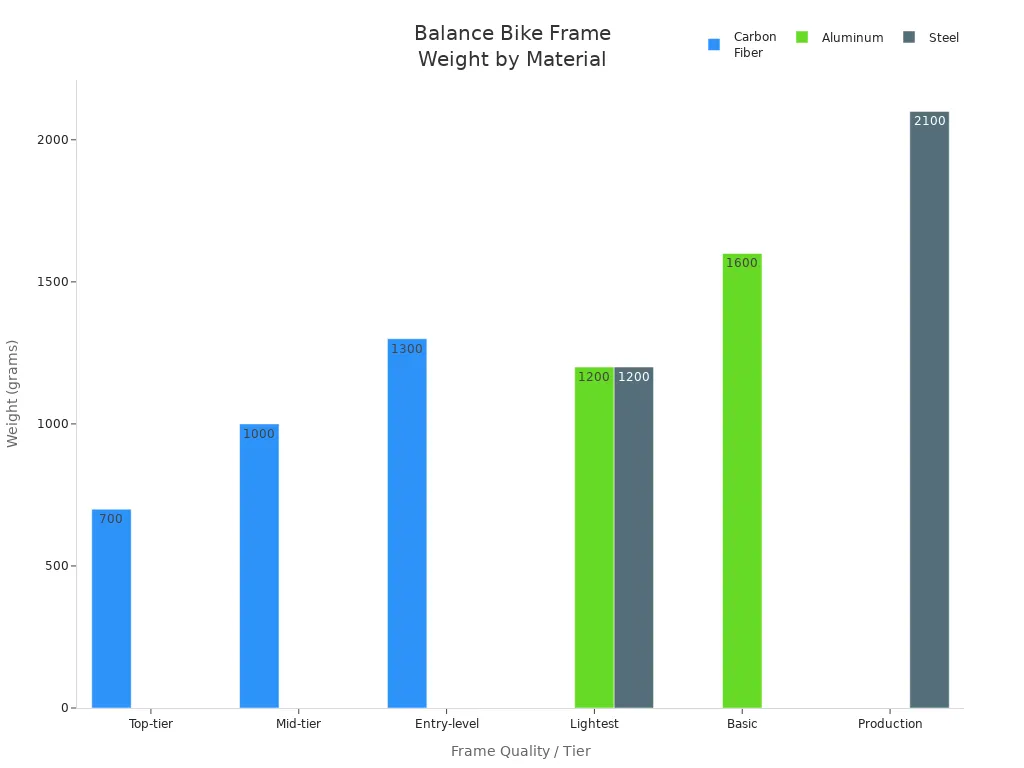
Picking the right frame material for a balance bike is very important for your child’s safety and fun. Each material has its own good and bad points. For example, steel is strong but can rust. Aluminum is light and does not rust. Plastic frames are cheap and can handle weather, but they might not be as strong as metal ones. Carbon frames are very strong and light, but they cost more.
When choosing a balance bike, think about how each material affects the environment. Steel usually has the least impact, while carbon has the most. It’s important to take care of all materials to make them last longer. By considering these things, you can find the best balance bike for your child.
Tip: Always check your child’s bike often for any signs of wear or damage, no matter what the frame material is.
FAQ
What is a balance bike?
A balance bike is a small, lightweight bike designed for young children. It helps them learn balance and coordination without pedals. Kids push off the ground with their feet and glide, making it easier to transition to a regular bike later.
At what age should my child start using a balance bike?
Most children can start using a balance bike between 18 months and 3 years old. Look for a bike that fits your child’s height. They should be able to sit comfortably and reach the ground with their feet.
How do I choose the right size balance bike?
To choose the right size, measure your child’s inseam. The bike’s seat height should allow them to place their feet flat on the ground. A proper fit ensures safety and comfort while riding.
Are balance bikes safe for my child?
Yes, balance bikes are generally safe when used correctly. Ensure your child wears a helmet and other protective gear. Supervise them while riding, especially in busy areas or near traffic.
How can I maintain my child’s balance bike?
Regularly check the tires for air pressure and inspect the frame for damage. Clean the bike with mild soap and water. Lubricate the moving parts to keep everything functioning smoothly and ensure a safe ride.
See Also
Discover The Lightest Materials Used For Bike Frames
Key Materials In Track Bike Frames And Their Importance
Essential Gas Bike Frame Tips For Every Builder
Best Materials For Electric Bike Frames And Benefits
Important Bike Frame Components Every Cyclist Must Understand
